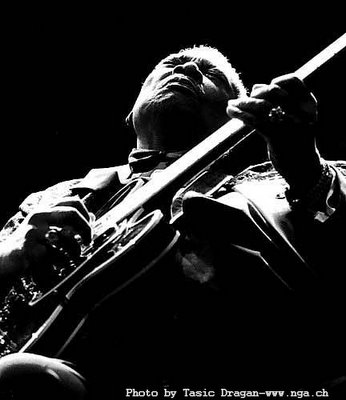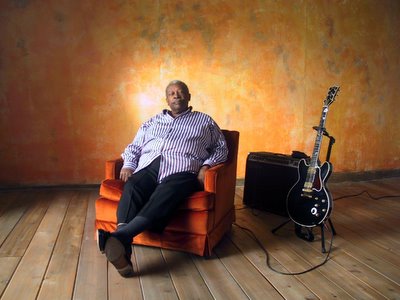
There are about 80 reasons for someone attending a B.B. King concert these days to have only modest expectations. There's one reason to hope for something great, but it's a compelling one: A great showman rises to any occasion.
The new octogenarian summoned all his energy Thursday night at the House of Blues to deliver his best local show in recent memory. The years seemed to melt away through the course of his 100 minutes onstage.
The best-known of all living blues legends played his trusty guitar Lucille tenderly if somewhat sparingly. But with every solo, dazzling one-string run or vibrato, he showed why he's always up near the top of any credible "greatest guitarists" list. His vocals were equally powerful, displaying the range and power of a much younger man.
Maybe it was a brief respite from the road before beginning what has been erroneously billed as King's last world tour.
Perhaps it was the Grammy he received last week -- No. 14 overall -- for "80," a duets album.
It may have been the presence of his Chicago blues belter daughter Shirley King and other relatives.
And then he was making his first appearance at the House of Blues in the city he acknowledged as "the home of the blues."
Or maybe he was just thumbing his nose at critics on several recent tour stops who complained that King at 80 talks more than he plays. (Indeed, he referred directly to that criticism during a lengthy narrative introduction to "Ain't That Just Like a Woman," one of several numbers that required and received enthusiastic audience participation.)
Whatever provided him with extra motivation, King was in peak form for a well-crafted set that started slowly and built to an exciting climax.
His set departed from his gritty Saturday-night-fish-fry standards such as "Let the Good Times Roll" and "Caledonia" in favor of such simple expressions of love as "Affection" and even "You Are My Sunshine."
The program was bookended with King's two late '60s hits, "Why I Sing the Blues" and "The Thrill Is Gone." The former, the Mississippi native's great social statement about the plight of inner-city African Americans, was regrettably abbreviated (and jazzed up). The latter, punctuated by King's three-piece horn section, brought the house down.
Those tunes brought King his first widespread exposure to the type of audiences who pack the House of Blues at $72.50 a head for two consecutive sold-out shows. But if that period represents King's greatest popularity, he has managed to maintain his hold on his blues kingdom ever since.
It's refreshing to see a performer of King's stature displaying such respect for his fans. That's reflected in the fact that each of his backing musicians other than the hardworking drummer was immaculately turned out in black tux. And more importantly, King interacts with the crowd with self-deprecating humor and shows sincere appreciation for each ovation.
Of course, King at 80 conserves his energy as much as possible. He carefully positions himself on a card-table chair, from which he performs what's become his signature move: raising his right arm as he simultaneously closes his eyes and shimmies in his seat.
There's never a sense, though, that he's merely going through the motions. When he sings of love lost and women who've let him down, he may emote in an exaggerated fashion by pretending to weep into a handkerchief or seize his heart. But he pours out his feelings, and you know that such heartache could not have been invented for the sake of a song.
Perhaps the most poignant moment came during Big Bill Broonzy's "Key to the Highway," when he sang, "When I leave this town I won't be back no more." The crowd gave him one last collective kiss, just in case the words proved prophetic.
Opening act Nicholas Barron's Hyperactive, a six-piece soul-funk outfit, displayed all the enthusiasm of the headliner, but with little of the tunesmanship. Barron, a longtime Chicago public-transit performer and advocate for other street musicians, might consider adding a couple of new elements to his sound -- namely a lead guitarist and bassist. But he did display a flair for songwriting with his original numbers.


Nenhum comentário:
Postar um comentário